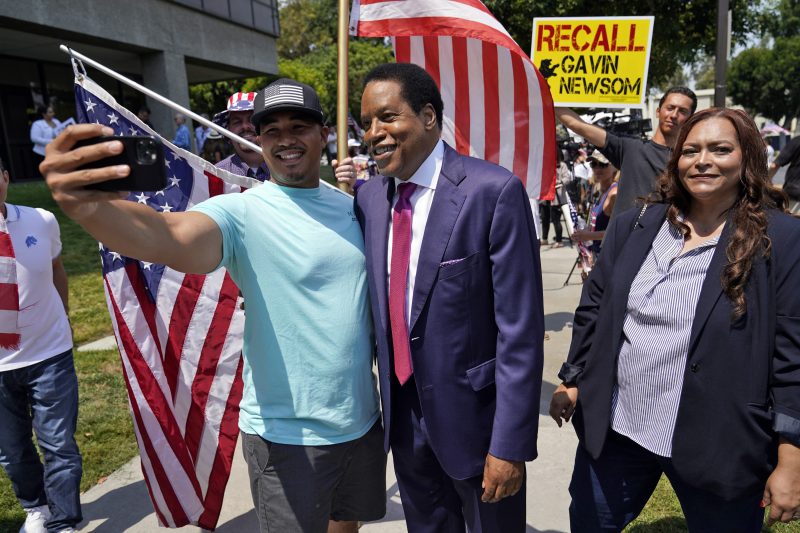
A starkly diverse Republican field. An almost-certainly White nominee.
California radio host Larry Elder on Thursday became the most recent Republican to announce his candidacy for the party’s 2024 presidential nomination. Elder’s most recent foray into electoral politics wasn’t particularly successful; he ran as the Republican alternative in the failed 2021 effort to recall Gov. Gavin Newsom (D). But why not aim one level higher?
With his announcement, Elder joined a remarkably diverse field. He’s one of two Black men in the mix for the nomination (including, as will be the case throughout this article, the exploratory committee formed by Sen. Tim Scott (R-S.C.)) and one of four candidates who isn’t a White man. Since 2000, only in the 2016 fields were as high a percentage of the declared candidates not a White man at this point in the contest. Of course back then, there were only three candidates in the mix on the Republican side and one, Hillary Clinton, on the Democratic.
That said, there is essentially no chance that Elder will be his party’s nominee. In fact, it’s almost certainly the case that the Republicans will, for the 43rd straight time, nominate a White man.
There has been a remarkable increase in the number of non-White-men seeking the presidency from both major parties. In part, this is a reflection of the increased diversity of the population. In part, it’s a reflection of the increased willingness of Americans to vote for a woman for president. In part, too, it’s a function of there being more people running for the presidency in general.
You can see this increase below. (Elder’s candidacy is the very small blue blip under the slightly less-small blue blip for Scott at the bottom of the chart.)
The most recent polling average from FiveThirtyEight, though, reinforces the likelihood that the Republican Party will continue with nearly two centuries of precedent. Former president Donald Trump leads in polling with 50 percent of the vote. Former South Carolina governor Nikki Haley is the only other declared candidate in the top tier of polling; she’s at 4 percent. In between are two White men who haven’t even announced bids (Florida Gov. Ron DeSantis and former vice president Mike Pence) who together gobble up more than 30 percent of the vote. (Almost all of it DeSantis.)
So why run for president? The increase in candidates in recent cycles is in part a function of the attention that running for president can yield.
American politics is fueled on attention; it drives poll numbers and fundraising. The advent of the social media age and the rise of heavily partisan media outlets provides a lot more vehicles for attention. Someone like Elder, literally a member of the partisan media universe, gets to be the focus of news articles like this one, however briefly. Maybe he makes it onto the debate stage and raises his profile further. In the meantime, he can ask his supporters to help fund this marketing effort. It’s win-win.
This sounds cynical, and perhaps it is. But Elder certainly knows that he will not beat Donald Trump. He probably also knows that even if a wormhole suddenly appears in the Mar-a-Lago ballroom and whisks Trump to Alpha Centauri, Elder isn’t going to beat DeSantis. While every politician and most celebrities at some point daydream about being elected as the most powerful politician in America, the practicalities hint at a very different future for most of those who actually run.
The Republican Party, though, is very happy to have him. It recognizes that the country’s changing demography probably poses a long-term disadvantage, and would love to have a debate stage that isn’t visually differentiated only by tie color or height. To be cynical again for a moment, though, the skepticism about the Republican Party that’s common among younger Americans is much less about representation than policy.
But, again, you never know. If that wormhole engulfs all of South Florida, taking Trump and DeSantis with it — somehow vacuuming up Mike Pence as he, I don’t know, is flying from Miami back to Indiana — then maybe Larry Elder or Nikki Haley or Tim Scott gets the nomination.
Then they just have to beat Biden.
